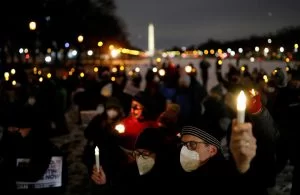THE Republican-controlled US Senate confirmed Kash Patel, President Donald Trump’s pick for FBI director, on Thursday (20), putting a Trump loyalist atop the nation’s most prominent law enforcement agency at a time of growing upheaval.
Patel was confirmed by a 51-49 vote. Two moderate Republicans, Senators Susan Collins of Maine and Lisa Murkowski of Alaska, joined all Democrats in opposing Patel, but it was not enough to overcome broad Republican support.
Collins and Murkowski, in opposing Patel, expressed concern about his past political advocacy for Trump and its potential effect on the FBI’s law enforcement activities.
Republican supporters argued he would reform an agency that has been hampered by a decline in public trust.
Democrats had forcefully opposed Patel’s nomination, saying his past calls for retribution against Trump’s critics made him unfit to lead the FBI.
“Patel will be a political and national security disaster,” Senator Dick Durbin, the top Democrat on the Senate Judiciary Committee, said in a statement.
Patel takes charge as Trump-backed officials seek to put their stamp on the FBI and its parent agency, the Justice Department, challenging decades-old traditions of independence and reorienting its mission toward Trump’s core priorities.
At least 75 career Justice Department lawyers and FBI officials, who normally keep their roles from administration to administration, have either resigned, been fired or stripped of their posts in the first month of the Trump administration.

“Donald Trump himself and those around him have been very clear that they do believe that the president should affect prosecutorial decisions and prosecutorial outcomes,” said Noah Bookbinder, a former federal prosecutor and head of the ethics group Citizens for Responsibility and Ethics in Washington.
“They were offended by the efforts to prosecute Donald Trump and those close to him, and they see it as part of their mission to exact vengeance.”
Trump-appointed officials have said many early moves are aimed at pursuing the administration’s policy goals and ending what they have described as abuses against Trump and his supporters.
Trump and his allies planned during his campaign to install loyalists in the department and weaken the autonomy of a career workforce that they have long viewed with suspicion.
Trump has been ensnared in Justice Department investigations dating back to his first campaign in 2016 and faced two federal criminal cases during his years out of power which were dropped after he won the election before reaching trials.
“This DOJ will return to its core function of prosecuting dangerous criminals, not pursuing politically motivated witch hunts,” a senior official, Chad Mizelle, said in a statement last week. Department officials did not respond to a request for comment.
Prosecutors working on Trump cases repeatedly denied any political influence over those prosecutions.
Tradition of Independence
The Trump administration’s efforts have collided with a deeply ingrained tradition of independence in federal criminal investigations, dating back to reforms that followed the Watergate scandal that toppled President Richard Nixon in 1974.
The move by the acting deputy attorney general, Emil Bove, to drop the Adams case caused particular tumult. The top federal prosecutor in Manhattan, where the case was brought, and at least seven other prosecutors in New York and Washington resigned in protest, with some accusing the Trump administration of improper motives.